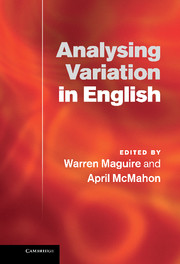Book contents
- Frontmatter
- Contents
- List of figures
- List of tables
- List of contributors
- List of abbreviations
- Introduction. Analysing variation in English: what we know, what we don't, and why it matters
- Part I Investigating variation in English: how do we know what we know?
- 1 Collecting data on phonology
- 2 How to make intuitions succeed: testing methods for analysing syntactic microvariation
- 3 Corpora: capturing language in use
- 4 Hypothesis generation
- 5 Quantifying relations between dialects
- 6 Perceptual dialectology
- Part II Why does it matter? Variation and other fields
- Notes
- References
- Index
6 - Perceptual dialectology
from Part I - Investigating variation in English: how do we know what we know?
Published online by Cambridge University Press: 03 May 2011
- Frontmatter
- Contents
- List of figures
- List of tables
- List of contributors
- List of abbreviations
- Introduction. Analysing variation in English: what we know, what we don't, and why it matters
- Part I Investigating variation in English: how do we know what we know?
- 1 Collecting data on phonology
- 2 How to make intuitions succeed: testing methods for analysing syntactic microvariation
- 3 Corpora: capturing language in use
- 4 Hypothesis generation
- 5 Quantifying relations between dialects
- 6 Perceptual dialectology
- Part II Why does it matter? Variation and other fields
- Notes
- References
- Index
Summary
Introduction
Perceptual dialectology is a discipline that investigates what language users themselves think and believe about language. It explores where people believe dialect areas to exist, and the geographical extent of these areas, along with how these people react to spoken language. Consequently, perceptual dialectology is ‘speaker-focused’, and informs linguistic accounts of how and why language varies. In England, study within a perceptual dialectology framework has been neglected until relatively recently. However, asking non-linguists directly about how and where language varies results in data that can be used alongside other sources in order to ‘fill the gaps’ in linguists' understanding of how language works.
In this chapter, we discuss the development of the field of perceptual dialectology. We place this area of study within a wider approach to the study of non-linguists' thoughts and beliefs about language, known (perhaps unhelpfully, as discussed below) as folk linguistics. We begin by discussing some of the first academic interest in non-linguists' beliefs about language and the beginning of a perceptual dialectology approach. We go on to discuss further the methods and findings of language attitude research, placing this area of investigation within the field of folk linguistics. We then move on to discuss recent developments in the field, both as a response to the perceived shortcomings of language attitude research, and as a continuation of a tradition of perceptual study. Finally, we introduce and discuss results of recent research undertaken in England.
- Type
- Chapter
- Information
- Analysing Variation in English , pp. 121 - 148Publisher: Cambridge University PressPrint publication year: 2011
- 11
- Cited by



